Business Ethics, Corporate Governance, and Universal Codes Analysis
VerifiedAdded on 2023/01/16
|10
|3292
|72
Report
AI Summary
This report provides a comprehensive analysis of business ethics and its application to accounting theories. It critically evaluates the concept of business ethics, highlighting the importance of ethical practices in the modern business environment. The report delves into the current trends and theories of corporate governance, including revised codes, leadership, and the influence of activist investors. It examines key theories like agency, stewardship, and stakeholder theories, illustrating their significance in shaping corporate behavior. Furthermore, the report assesses the universal corporate governance code and its incorporation of business ethics, emphasizing the need for ethical standards in all companies operating globally. It underscores the importance of aligning the interests of managers, stakeholders, and shareholders to ensure ethical conduct and transparency. The report concludes by emphasizing the crucial role of ethical practices and regulatory frameworks in preventing corporate scandals and promoting sustainable business practices, providing a valuable resource for students and professionals in the field of finance and accounting.
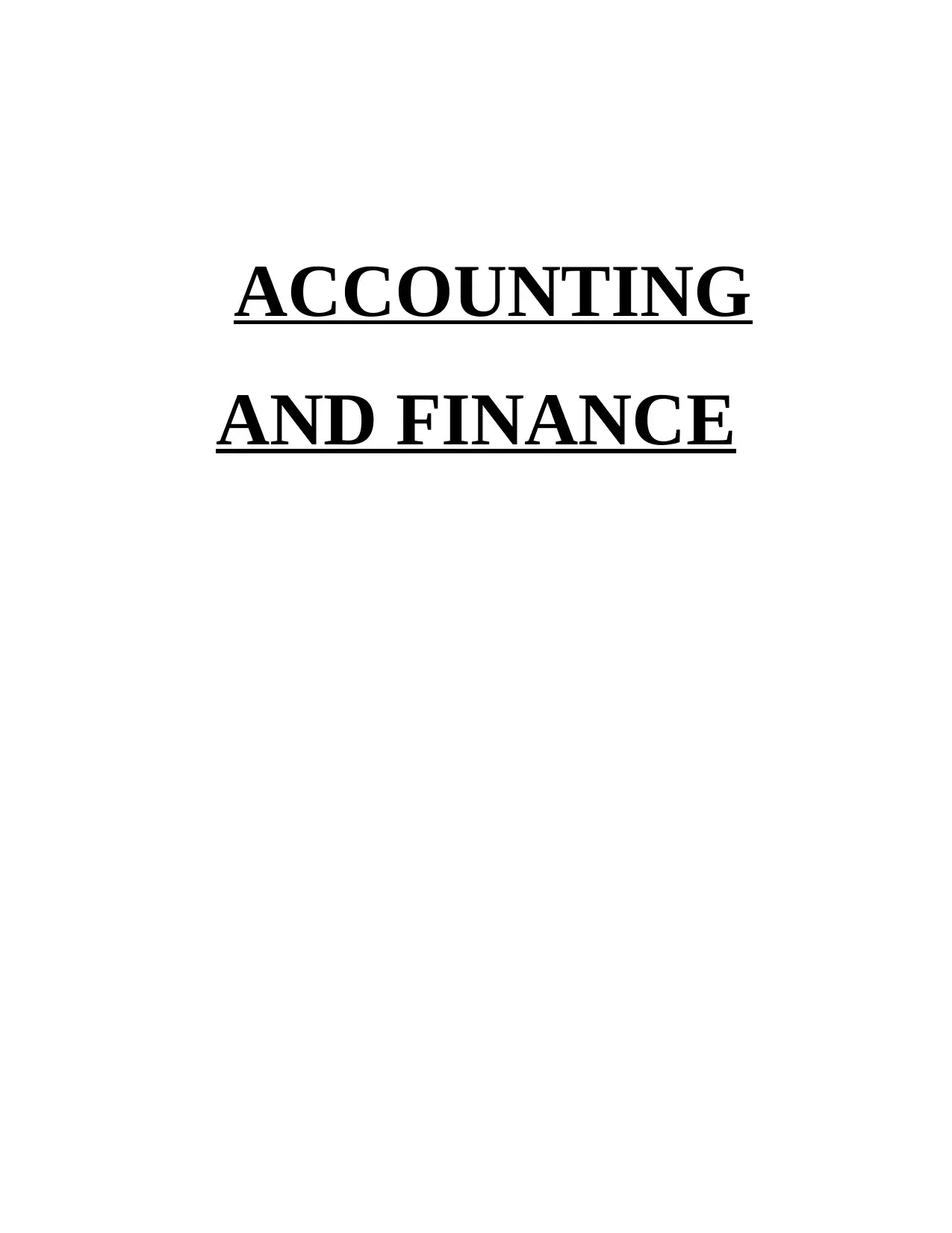
ACCOUNTING
AND FINANCE
AND FINANCE
Paraphrase This Document
Need a fresh take? Get an instant paraphrase of this document with our AI Paraphraser
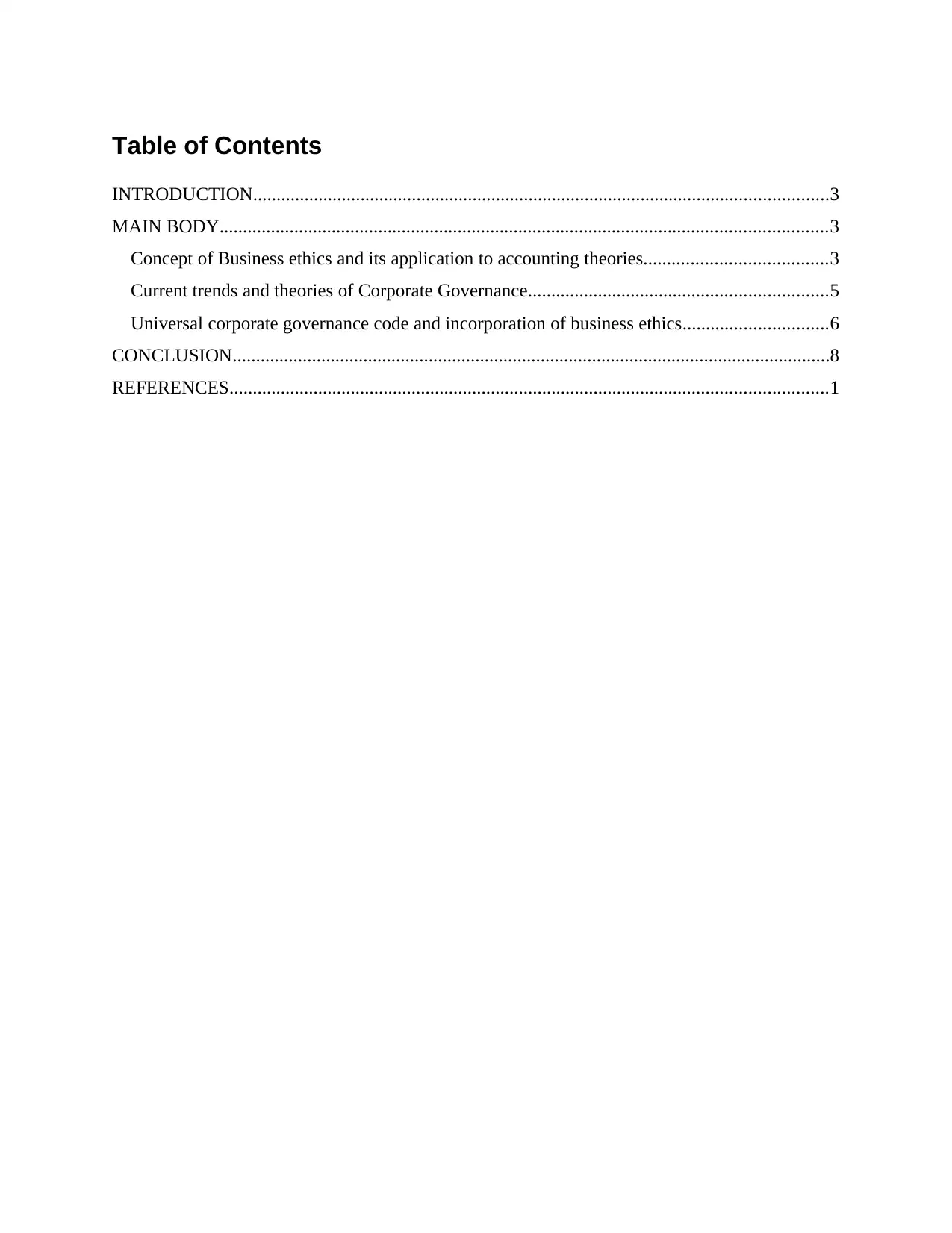
Table of Contents
INTRODUCTION...........................................................................................................................3
MAIN BODY..................................................................................................................................3
Concept of Business ethics and its application to accounting theories.......................................3
Current trends and theories of Corporate Governance................................................................5
Universal corporate governance code and incorporation of business ethics...............................6
CONCLUSION................................................................................................................................8
REFERENCES................................................................................................................................1
INTRODUCTION...........................................................................................................................3
MAIN BODY..................................................................................................................................3
Concept of Business ethics and its application to accounting theories.......................................3
Current trends and theories of Corporate Governance................................................................5
Universal corporate governance code and incorporation of business ethics...............................6
CONCLUSION................................................................................................................................8
REFERENCES................................................................................................................................1
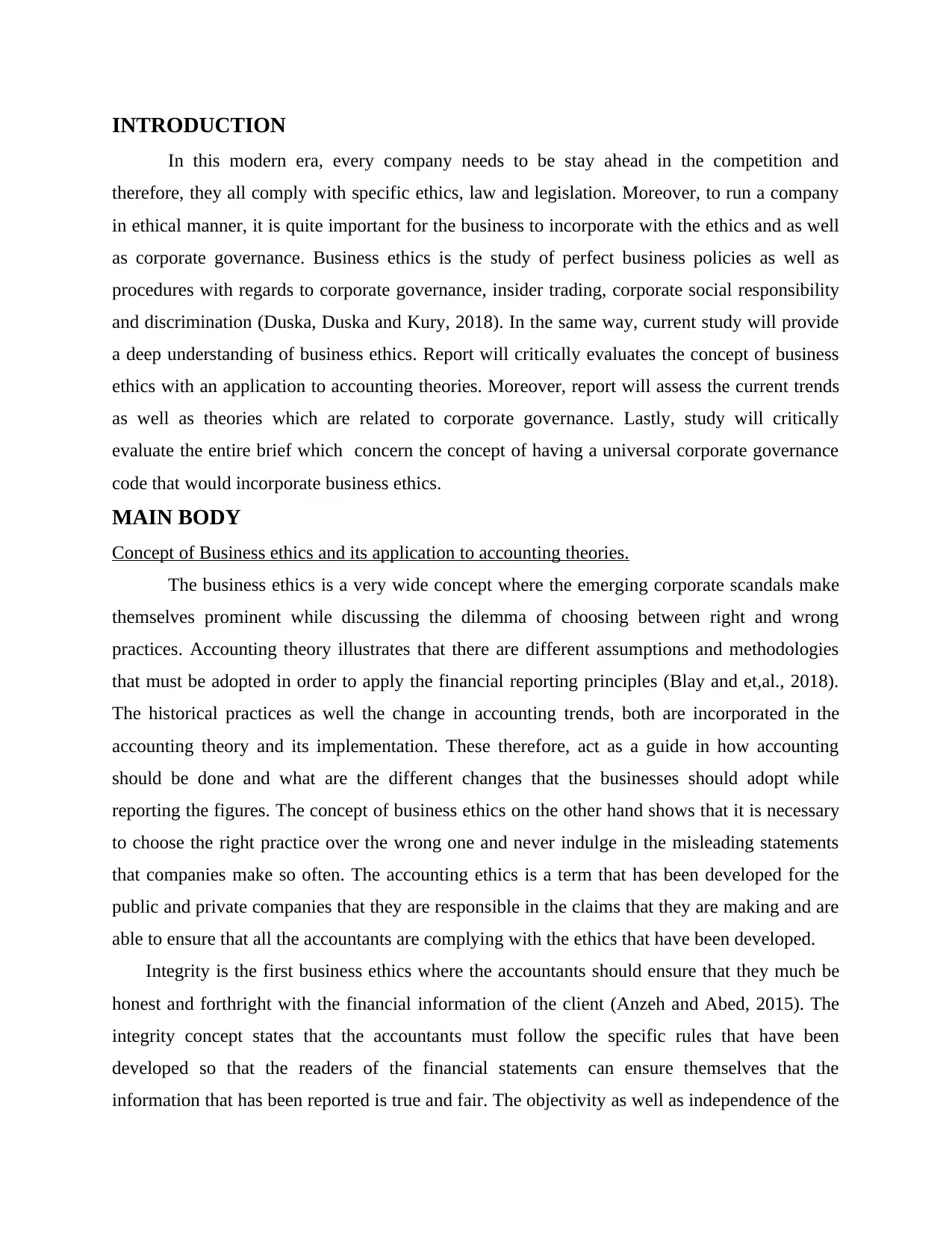
INTRODUCTION
In this modern era, every company needs to be stay ahead in the competition and
therefore, they all comply with specific ethics, law and legislation. Moreover, to run a company
in ethical manner, it is quite important for the business to incorporate with the ethics and as well
as corporate governance. Business ethics is the study of perfect business policies as well as
procedures with regards to corporate governance, insider trading, corporate social responsibility
and discrimination (Duska, Duska and Kury, 2018). In the same way, current study will provide
a deep understanding of business ethics. Report will critically evaluates the concept of business
ethics with an application to accounting theories. Moreover, report will assess the current trends
as well as theories which are related to corporate governance. Lastly, study will critically
evaluate the entire brief which concern the concept of having a universal corporate governance
code that would incorporate business ethics.
MAIN BODY
Concept of Business ethics and its application to accounting theories.
The business ethics is a very wide concept where the emerging corporate scandals make
themselves prominent while discussing the dilemma of choosing between right and wrong
practices. Accounting theory illustrates that there are different assumptions and methodologies
that must be adopted in order to apply the financial reporting principles (Blay and et,al., 2018).
The historical practices as well the change in accounting trends, both are incorporated in the
accounting theory and its implementation. These therefore, act as a guide in how accounting
should be done and what are the different changes that the businesses should adopt while
reporting the figures. The concept of business ethics on the other hand shows that it is necessary
to choose the right practice over the wrong one and never indulge in the misleading statements
that companies make so often. The accounting ethics is a term that has been developed for the
public and private companies that they are responsible in the claims that they are making and are
able to ensure that all the accountants are complying with the ethics that have been developed.
Integrity is the first business ethics where the accountants should ensure that they much be
honest and forthright with the financial information of the client (Anzeh and Abed, 2015). The
integrity concept states that the accountants must follow the specific rules that have been
developed so that the readers of the financial statements can ensure themselves that the
information that has been reported is true and fair. The objectivity as well as independence of the
In this modern era, every company needs to be stay ahead in the competition and
therefore, they all comply with specific ethics, law and legislation. Moreover, to run a company
in ethical manner, it is quite important for the business to incorporate with the ethics and as well
as corporate governance. Business ethics is the study of perfect business policies as well as
procedures with regards to corporate governance, insider trading, corporate social responsibility
and discrimination (Duska, Duska and Kury, 2018). In the same way, current study will provide
a deep understanding of business ethics. Report will critically evaluates the concept of business
ethics with an application to accounting theories. Moreover, report will assess the current trends
as well as theories which are related to corporate governance. Lastly, study will critically
evaluate the entire brief which concern the concept of having a universal corporate governance
code that would incorporate business ethics.
MAIN BODY
Concept of Business ethics and its application to accounting theories.
The business ethics is a very wide concept where the emerging corporate scandals make
themselves prominent while discussing the dilemma of choosing between right and wrong
practices. Accounting theory illustrates that there are different assumptions and methodologies
that must be adopted in order to apply the financial reporting principles (Blay and et,al., 2018).
The historical practices as well the change in accounting trends, both are incorporated in the
accounting theory and its implementation. These therefore, act as a guide in how accounting
should be done and what are the different changes that the businesses should adopt while
reporting the figures. The concept of business ethics on the other hand shows that it is necessary
to choose the right practice over the wrong one and never indulge in the misleading statements
that companies make so often. The accounting ethics is a term that has been developed for the
public and private companies that they are responsible in the claims that they are making and are
able to ensure that all the accountants are complying with the ethics that have been developed.
Integrity is the first business ethics where the accountants should ensure that they much be
honest and forthright with the financial information of the client (Anzeh and Abed, 2015). The
integrity concept states that the accountants must follow the specific rules that have been
developed so that the readers of the financial statements can ensure themselves that the
information that has been reported is true and fair. The objectivity as well as independence of the
⊘ This is a preview!⊘
Do you want full access?
Subscribe today to unlock all pages.

Trusted by 1+ million students worldwide
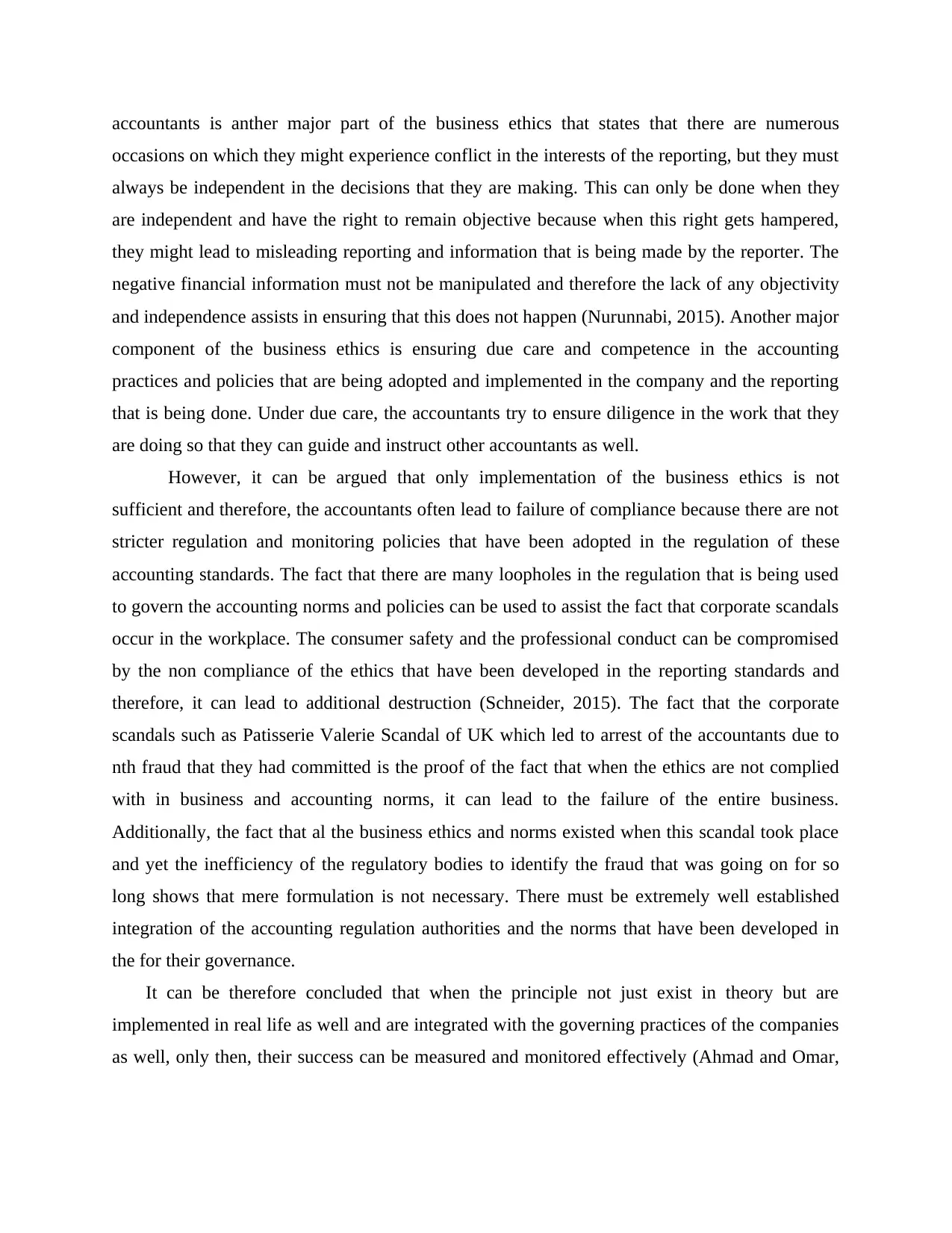
accountants is anther major part of the business ethics that states that there are numerous
occasions on which they might experience conflict in the interests of the reporting, but they must
always be independent in the decisions that they are making. This can only be done when they
are independent and have the right to remain objective because when this right gets hampered,
they might lead to misleading reporting and information that is being made by the reporter. The
negative financial information must not be manipulated and therefore the lack of any objectivity
and independence assists in ensuring that this does not happen (Nurunnabi, 2015). Another major
component of the business ethics is ensuring due care and competence in the accounting
practices and policies that are being adopted and implemented in the company and the reporting
that is being done. Under due care, the accountants try to ensure diligence in the work that they
are doing so that they can guide and instruct other accountants as well.
However, it can be argued that only implementation of the business ethics is not
sufficient and therefore, the accountants often lead to failure of compliance because there are not
stricter regulation and monitoring policies that have been adopted in the regulation of these
accounting standards. The fact that there are many loopholes in the regulation that is being used
to govern the accounting norms and policies can be used to assist the fact that corporate scandals
occur in the workplace. The consumer safety and the professional conduct can be compromised
by the non compliance of the ethics that have been developed in the reporting standards and
therefore, it can lead to additional destruction (Schneider, 2015). The fact that the corporate
scandals such as Patisserie Valerie Scandal of UK which led to arrest of the accountants due to
nth fraud that they had committed is the proof of the fact that when the ethics are not complied
with in business and accounting norms, it can lead to the failure of the entire business.
Additionally, the fact that al the business ethics and norms existed when this scandal took place
and yet the inefficiency of the regulatory bodies to identify the fraud that was going on for so
long shows that mere formulation is not necessary. There must be extremely well established
integration of the accounting regulation authorities and the norms that have been developed in
the for their governance.
It can be therefore concluded that when the principle not just exist in theory but are
implemented in real life as well and are integrated with the governing practices of the companies
as well, only then, their success can be measured and monitored effectively (Ahmad and Omar,
occasions on which they might experience conflict in the interests of the reporting, but they must
always be independent in the decisions that they are making. This can only be done when they
are independent and have the right to remain objective because when this right gets hampered,
they might lead to misleading reporting and information that is being made by the reporter. The
negative financial information must not be manipulated and therefore the lack of any objectivity
and independence assists in ensuring that this does not happen (Nurunnabi, 2015). Another major
component of the business ethics is ensuring due care and competence in the accounting
practices and policies that are being adopted and implemented in the company and the reporting
that is being done. Under due care, the accountants try to ensure diligence in the work that they
are doing so that they can guide and instruct other accountants as well.
However, it can be argued that only implementation of the business ethics is not
sufficient and therefore, the accountants often lead to failure of compliance because there are not
stricter regulation and monitoring policies that have been adopted in the regulation of these
accounting standards. The fact that there are many loopholes in the regulation that is being used
to govern the accounting norms and policies can be used to assist the fact that corporate scandals
occur in the workplace. The consumer safety and the professional conduct can be compromised
by the non compliance of the ethics that have been developed in the reporting standards and
therefore, it can lead to additional destruction (Schneider, 2015). The fact that the corporate
scandals such as Patisserie Valerie Scandal of UK which led to arrest of the accountants due to
nth fraud that they had committed is the proof of the fact that when the ethics are not complied
with in business and accounting norms, it can lead to the failure of the entire business.
Additionally, the fact that al the business ethics and norms existed when this scandal took place
and yet the inefficiency of the regulatory bodies to identify the fraud that was going on for so
long shows that mere formulation is not necessary. There must be extremely well established
integration of the accounting regulation authorities and the norms that have been developed in
the for their governance.
It can be therefore concluded that when the principle not just exist in theory but are
implemented in real life as well and are integrated with the governing practices of the companies
as well, only then, their success can be measured and monitored effectively (Ahmad and Omar,
Paraphrase This Document
Need a fresh take? Get an instant paraphrase of this document with our AI Paraphraser
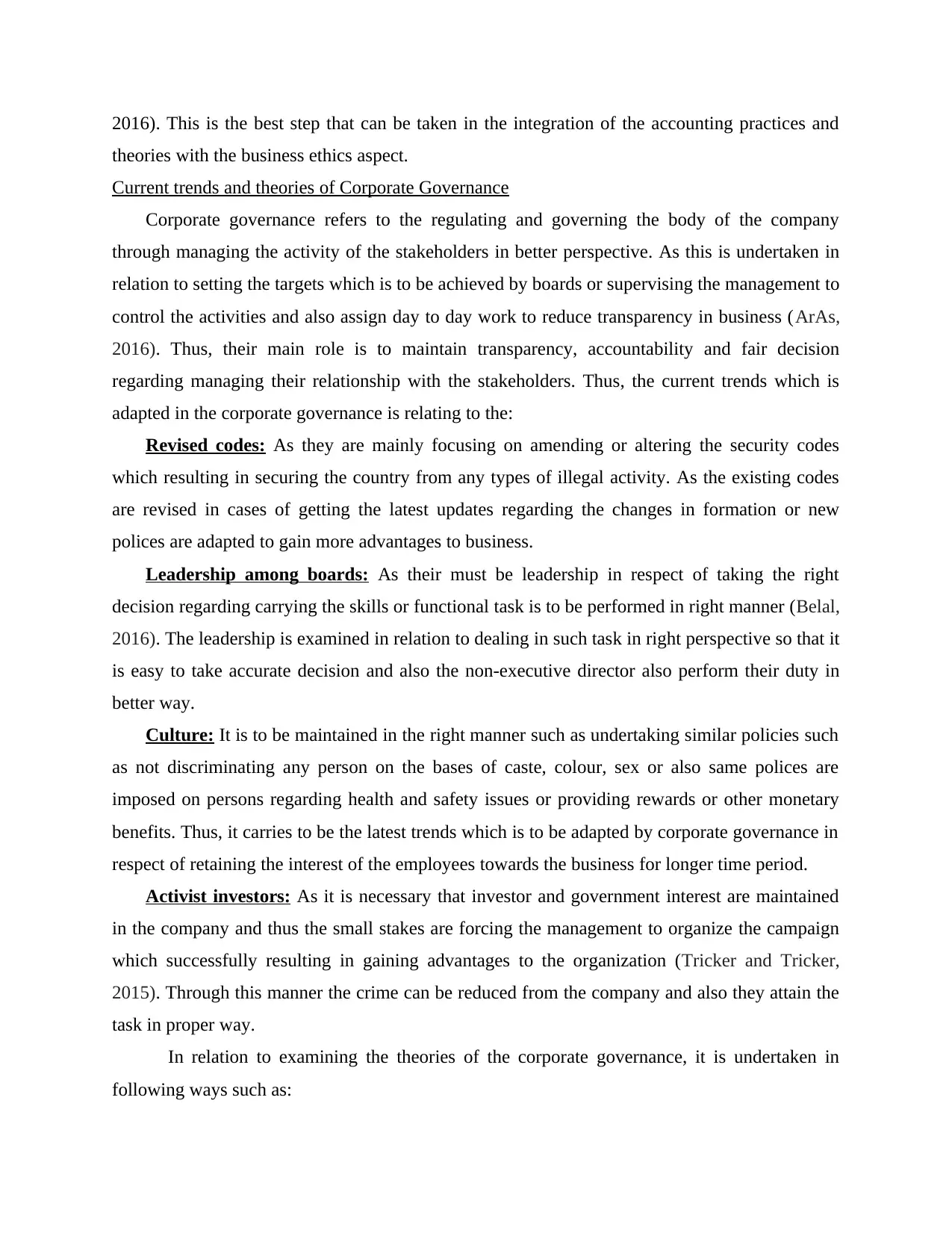
2016). This is the best step that can be taken in the integration of the accounting practices and
theories with the business ethics aspect.
Current trends and theories of Corporate Governance
Corporate governance refers to the regulating and governing the body of the company
through managing the activity of the stakeholders in better perspective. As this is undertaken in
relation to setting the targets which is to be achieved by boards or supervising the management to
control the activities and also assign day to day work to reduce transparency in business (ArAs,
2016). Thus, their main role is to maintain transparency, accountability and fair decision
regarding managing their relationship with the stakeholders. Thus, the current trends which is
adapted in the corporate governance is relating to the:
Revised codes: As they are mainly focusing on amending or altering the security codes
which resulting in securing the country from any types of illegal activity. As the existing codes
are revised in cases of getting the latest updates regarding the changes in formation or new
polices are adapted to gain more advantages to business.
Leadership among boards: As their must be leadership in respect of taking the right
decision regarding carrying the skills or functional task is to be performed in right manner (Belal,
2016). The leadership is examined in relation to dealing in such task in right perspective so that it
is easy to take accurate decision and also the non-executive director also perform their duty in
better way.
Culture: It is to be maintained in the right manner such as undertaking similar policies such
as not discriminating any person on the bases of caste, colour, sex or also same polices are
imposed on persons regarding health and safety issues or providing rewards or other monetary
benefits. Thus, it carries to be the latest trends which is to be adapted by corporate governance in
respect of retaining the interest of the employees towards the business for longer time period.
Activist investors: As it is necessary that investor and government interest are maintained
in the company and thus the small stakes are forcing the management to organize the campaign
which successfully resulting in gaining advantages to the organization (Tricker and Tricker,
2015). Through this manner the crime can be reduced from the company and also they attain the
task in proper way.
In relation to examining the theories of the corporate governance, it is undertaken in
following ways such as:
theories with the business ethics aspect.
Current trends and theories of Corporate Governance
Corporate governance refers to the regulating and governing the body of the company
through managing the activity of the stakeholders in better perspective. As this is undertaken in
relation to setting the targets which is to be achieved by boards or supervising the management to
control the activities and also assign day to day work to reduce transparency in business (ArAs,
2016). Thus, their main role is to maintain transparency, accountability and fair decision
regarding managing their relationship with the stakeholders. Thus, the current trends which is
adapted in the corporate governance is relating to the:
Revised codes: As they are mainly focusing on amending or altering the security codes
which resulting in securing the country from any types of illegal activity. As the existing codes
are revised in cases of getting the latest updates regarding the changes in formation or new
polices are adapted to gain more advantages to business.
Leadership among boards: As their must be leadership in respect of taking the right
decision regarding carrying the skills or functional task is to be performed in right manner (Belal,
2016). The leadership is examined in relation to dealing in such task in right perspective so that it
is easy to take accurate decision and also the non-executive director also perform their duty in
better way.
Culture: It is to be maintained in the right manner such as undertaking similar policies such
as not discriminating any person on the bases of caste, colour, sex or also same polices are
imposed on persons regarding health and safety issues or providing rewards or other monetary
benefits. Thus, it carries to be the latest trends which is to be adapted by corporate governance in
respect of retaining the interest of the employees towards the business for longer time period.
Activist investors: As it is necessary that investor and government interest are maintained
in the company and thus the small stakes are forcing the management to organize the campaign
which successfully resulting in gaining advantages to the organization (Tricker and Tricker,
2015). Through this manner the crime can be reduced from the company and also they attain the
task in proper way.
In relation to examining the theories of the corporate governance, it is undertaken in
following ways such as:
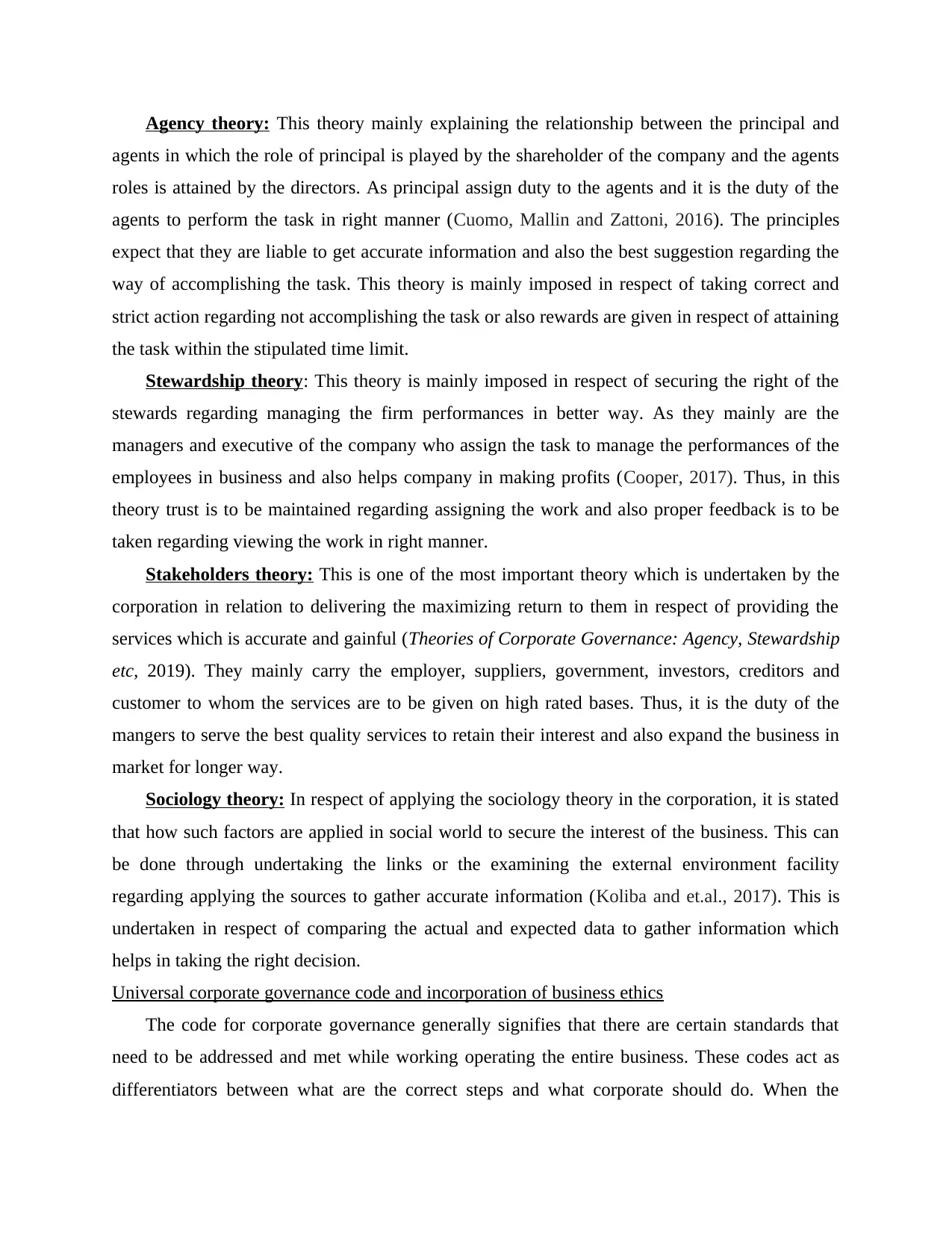
Agency theory: This theory mainly explaining the relationship between the principal and
agents in which the role of principal is played by the shareholder of the company and the agents
roles is attained by the directors. As principal assign duty to the agents and it is the duty of the
agents to perform the task in right manner (Cuomo, Mallin and Zattoni, 2016). The principles
expect that they are liable to get accurate information and also the best suggestion regarding the
way of accomplishing the task. This theory is mainly imposed in respect of taking correct and
strict action regarding not accomplishing the task or also rewards are given in respect of attaining
the task within the stipulated time limit.
Stewardship theory: This theory is mainly imposed in respect of securing the right of the
stewards regarding managing the firm performances in better way. As they mainly are the
managers and executive of the company who assign the task to manage the performances of the
employees in business and also helps company in making profits (Cooper, 2017). Thus, in this
theory trust is to be maintained regarding assigning the work and also proper feedback is to be
taken regarding viewing the work in right manner.
Stakeholders theory: This is one of the most important theory which is undertaken by the
corporation in relation to delivering the maximizing return to them in respect of providing the
services which is accurate and gainful (Theories of Corporate Governance: Agency, Stewardship
etc, 2019). They mainly carry the employer, suppliers, government, investors, creditors and
customer to whom the services are to be given on high rated bases. Thus, it is the duty of the
mangers to serve the best quality services to retain their interest and also expand the business in
market for longer way.
Sociology theory: In respect of applying the sociology theory in the corporation, it is stated
that how such factors are applied in social world to secure the interest of the business. This can
be done through undertaking the links or the examining the external environment facility
regarding applying the sources to gather accurate information (Koliba and et.al., 2017). This is
undertaken in respect of comparing the actual and expected data to gather information which
helps in taking the right decision.
Universal corporate governance code and incorporation of business ethics
The code for corporate governance generally signifies that there are certain standards that
need to be addressed and met while working operating the entire business. These codes act as
differentiators between what are the correct steps and what corporate should do. When the
agents in which the role of principal is played by the shareholder of the company and the agents
roles is attained by the directors. As principal assign duty to the agents and it is the duty of the
agents to perform the task in right manner (Cuomo, Mallin and Zattoni, 2016). The principles
expect that they are liable to get accurate information and also the best suggestion regarding the
way of accomplishing the task. This theory is mainly imposed in respect of taking correct and
strict action regarding not accomplishing the task or also rewards are given in respect of attaining
the task within the stipulated time limit.
Stewardship theory: This theory is mainly imposed in respect of securing the right of the
stewards regarding managing the firm performances in better way. As they mainly are the
managers and executive of the company who assign the task to manage the performances of the
employees in business and also helps company in making profits (Cooper, 2017). Thus, in this
theory trust is to be maintained regarding assigning the work and also proper feedback is to be
taken regarding viewing the work in right manner.
Stakeholders theory: This is one of the most important theory which is undertaken by the
corporation in relation to delivering the maximizing return to them in respect of providing the
services which is accurate and gainful (Theories of Corporate Governance: Agency, Stewardship
etc, 2019). They mainly carry the employer, suppliers, government, investors, creditors and
customer to whom the services are to be given on high rated bases. Thus, it is the duty of the
mangers to serve the best quality services to retain their interest and also expand the business in
market for longer way.
Sociology theory: In respect of applying the sociology theory in the corporation, it is stated
that how such factors are applied in social world to secure the interest of the business. This can
be done through undertaking the links or the examining the external environment facility
regarding applying the sources to gather accurate information (Koliba and et.al., 2017). This is
undertaken in respect of comparing the actual and expected data to gather information which
helps in taking the right decision.
Universal corporate governance code and incorporation of business ethics
The code for corporate governance generally signifies that there are certain standards that
need to be addressed and met while working operating the entire business. These codes act as
differentiators between what are the correct steps and what corporate should do. When the
⊘ This is a preview!⊘
Do you want full access?
Subscribe today to unlock all pages.

Trusted by 1+ million students worldwide
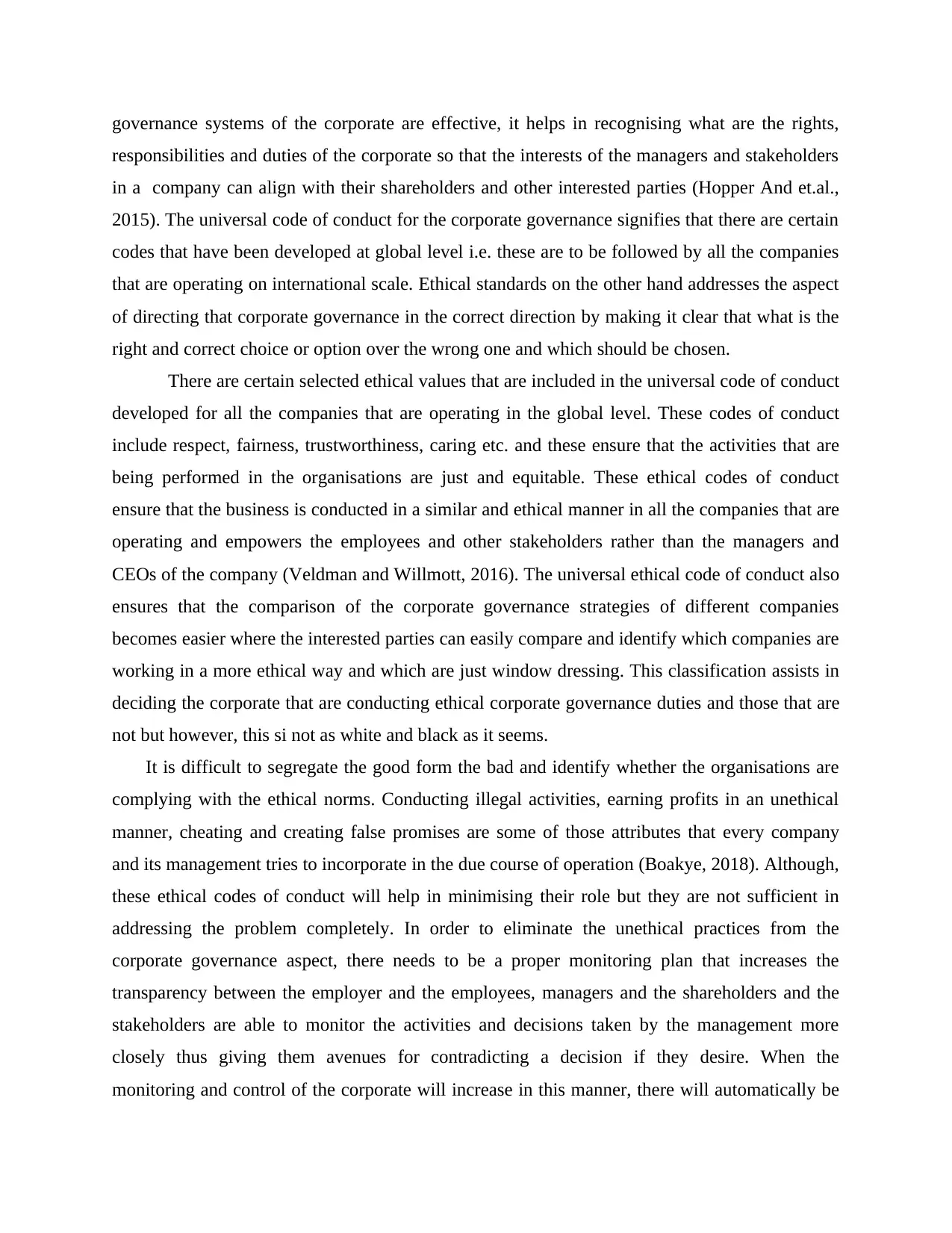
governance systems of the corporate are effective, it helps in recognising what are the rights,
responsibilities and duties of the corporate so that the interests of the managers and stakeholders
in a company can align with their shareholders and other interested parties (Hopper And et.al.,
2015). The universal code of conduct for the corporate governance signifies that there are certain
codes that have been developed at global level i.e. these are to be followed by all the companies
that are operating on international scale. Ethical standards on the other hand addresses the aspect
of directing that corporate governance in the correct direction by making it clear that what is the
right and correct choice or option over the wrong one and which should be chosen.
There are certain selected ethical values that are included in the universal code of conduct
developed for all the companies that are operating in the global level. These codes of conduct
include respect, fairness, trustworthiness, caring etc. and these ensure that the activities that are
being performed in the organisations are just and equitable. These ethical codes of conduct
ensure that the business is conducted in a similar and ethical manner in all the companies that are
operating and empowers the employees and other stakeholders rather than the managers and
CEOs of the company (Veldman and Willmott, 2016). The universal ethical code of conduct also
ensures that the comparison of the corporate governance strategies of different companies
becomes easier where the interested parties can easily compare and identify which companies are
working in a more ethical way and which are just window dressing. This classification assists in
deciding the corporate that are conducting ethical corporate governance duties and those that are
not but however, this si not as white and black as it seems.
It is difficult to segregate the good form the bad and identify whether the organisations are
complying with the ethical norms. Conducting illegal activities, earning profits in an unethical
manner, cheating and creating false promises are some of those attributes that every company
and its management tries to incorporate in the due course of operation (Boakye, 2018). Although,
these ethical codes of conduct will help in minimising their role but they are not sufficient in
addressing the problem completely. In order to eliminate the unethical practices from the
corporate governance aspect, there needs to be a proper monitoring plan that increases the
transparency between the employer and the employees, managers and the shareholders and the
stakeholders are able to monitor the activities and decisions taken by the management more
closely thus giving them avenues for contradicting a decision if they desire. When the
monitoring and control of the corporate will increase in this manner, there will automatically be
responsibilities and duties of the corporate so that the interests of the managers and stakeholders
in a company can align with their shareholders and other interested parties (Hopper And et.al.,
2015). The universal code of conduct for the corporate governance signifies that there are certain
codes that have been developed at global level i.e. these are to be followed by all the companies
that are operating on international scale. Ethical standards on the other hand addresses the aspect
of directing that corporate governance in the correct direction by making it clear that what is the
right and correct choice or option over the wrong one and which should be chosen.
There are certain selected ethical values that are included in the universal code of conduct
developed for all the companies that are operating in the global level. These codes of conduct
include respect, fairness, trustworthiness, caring etc. and these ensure that the activities that are
being performed in the organisations are just and equitable. These ethical codes of conduct
ensure that the business is conducted in a similar and ethical manner in all the companies that are
operating and empowers the employees and other stakeholders rather than the managers and
CEOs of the company (Veldman and Willmott, 2016). The universal ethical code of conduct also
ensures that the comparison of the corporate governance strategies of different companies
becomes easier where the interested parties can easily compare and identify which companies are
working in a more ethical way and which are just window dressing. This classification assists in
deciding the corporate that are conducting ethical corporate governance duties and those that are
not but however, this si not as white and black as it seems.
It is difficult to segregate the good form the bad and identify whether the organisations are
complying with the ethical norms. Conducting illegal activities, earning profits in an unethical
manner, cheating and creating false promises are some of those attributes that every company
and its management tries to incorporate in the due course of operation (Boakye, 2018). Although,
these ethical codes of conduct will help in minimising their role but they are not sufficient in
addressing the problem completely. In order to eliminate the unethical practices from the
corporate governance aspect, there needs to be a proper monitoring plan that increases the
transparency between the employer and the employees, managers and the shareholders and the
stakeholders are able to monitor the activities and decisions taken by the management more
closely thus giving them avenues for contradicting a decision if they desire. When the
monitoring and control of the corporate will increase in this manner, there will automatically be
Paraphrase This Document
Need a fresh take? Get an instant paraphrase of this document with our AI Paraphraser
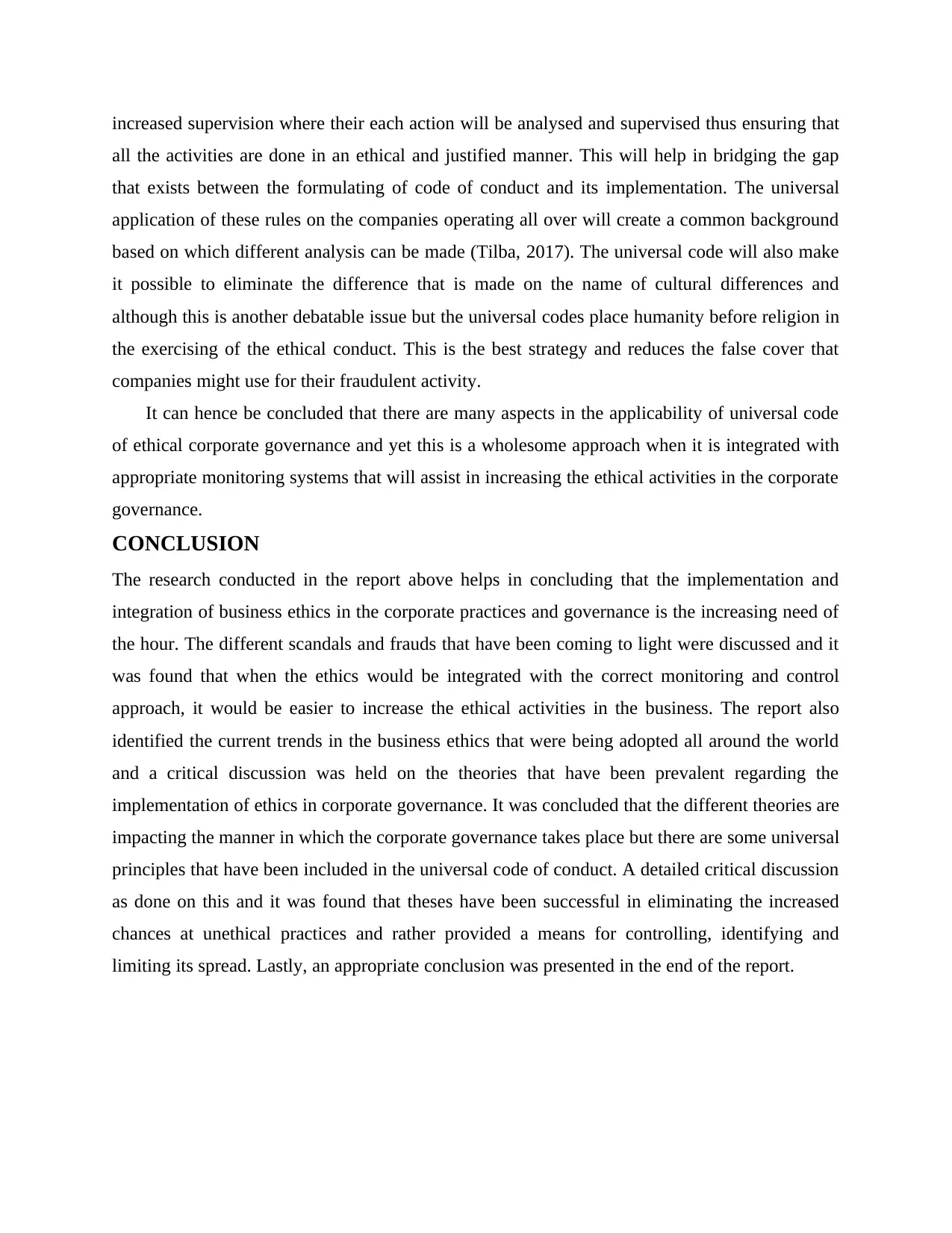
increased supervision where their each action will be analysed and supervised thus ensuring that
all the activities are done in an ethical and justified manner. This will help in bridging the gap
that exists between the formulating of code of conduct and its implementation. The universal
application of these rules on the companies operating all over will create a common background
based on which different analysis can be made (Tilba, 2017). The universal code will also make
it possible to eliminate the difference that is made on the name of cultural differences and
although this is another debatable issue but the universal codes place humanity before religion in
the exercising of the ethical conduct. This is the best strategy and reduces the false cover that
companies might use for their fraudulent activity.
It can hence be concluded that there are many aspects in the applicability of universal code
of ethical corporate governance and yet this is a wholesome approach when it is integrated with
appropriate monitoring systems that will assist in increasing the ethical activities in the corporate
governance.
CONCLUSION
The research conducted in the report above helps in concluding that the implementation and
integration of business ethics in the corporate practices and governance is the increasing need of
the hour. The different scandals and frauds that have been coming to light were discussed and it
was found that when the ethics would be integrated with the correct monitoring and control
approach, it would be easier to increase the ethical activities in the business. The report also
identified the current trends in the business ethics that were being adopted all around the world
and a critical discussion was held on the theories that have been prevalent regarding the
implementation of ethics in corporate governance. It was concluded that the different theories are
impacting the manner in which the corporate governance takes place but there are some universal
principles that have been included in the universal code of conduct. A detailed critical discussion
as done on this and it was found that theses have been successful in eliminating the increased
chances at unethical practices and rather provided a means for controlling, identifying and
limiting its spread. Lastly, an appropriate conclusion was presented in the end of the report.
all the activities are done in an ethical and justified manner. This will help in bridging the gap
that exists between the formulating of code of conduct and its implementation. The universal
application of these rules on the companies operating all over will create a common background
based on which different analysis can be made (Tilba, 2017). The universal code will also make
it possible to eliminate the difference that is made on the name of cultural differences and
although this is another debatable issue but the universal codes place humanity before religion in
the exercising of the ethical conduct. This is the best strategy and reduces the false cover that
companies might use for their fraudulent activity.
It can hence be concluded that there are many aspects in the applicability of universal code
of ethical corporate governance and yet this is a wholesome approach when it is integrated with
appropriate monitoring systems that will assist in increasing the ethical activities in the corporate
governance.
CONCLUSION
The research conducted in the report above helps in concluding that the implementation and
integration of business ethics in the corporate practices and governance is the increasing need of
the hour. The different scandals and frauds that have been coming to light were discussed and it
was found that when the ethics would be integrated with the correct monitoring and control
approach, it would be easier to increase the ethical activities in the business. The report also
identified the current trends in the business ethics that were being adopted all around the world
and a critical discussion was held on the theories that have been prevalent regarding the
implementation of ethics in corporate governance. It was concluded that the different theories are
impacting the manner in which the corporate governance takes place but there are some universal
principles that have been included in the universal code of conduct. A detailed critical discussion
as done on this and it was found that theses have been successful in eliminating the increased
chances at unethical practices and rather provided a means for controlling, identifying and
limiting its spread. Lastly, an appropriate conclusion was presented in the end of the report.
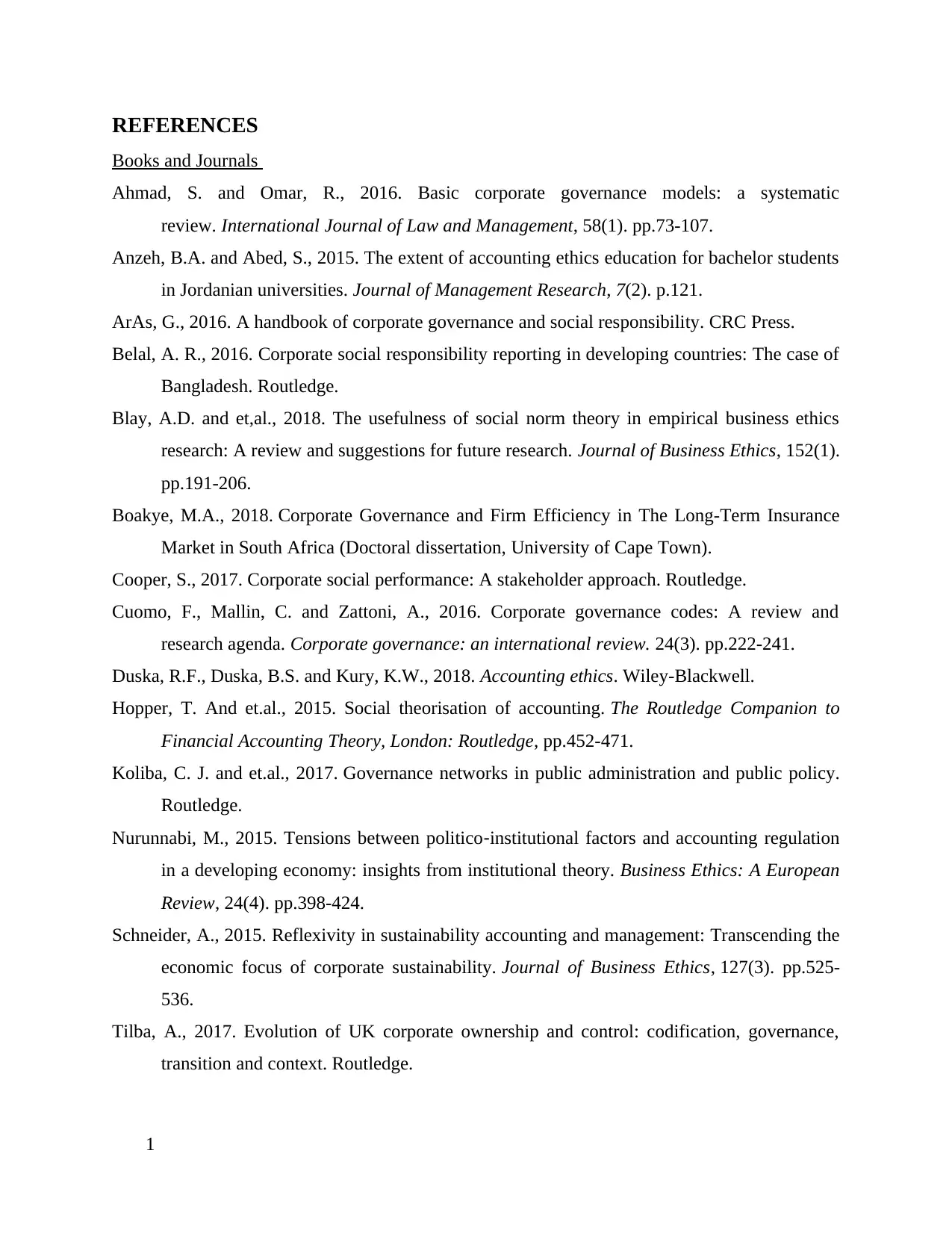
REFERENCES
Books and Journals
Ahmad, S. and Omar, R., 2016. Basic corporate governance models: a systematic
review. International Journal of Law and Management, 58(1). pp.73-107.
Anzeh, B.A. and Abed, S., 2015. The extent of accounting ethics education for bachelor students
in Jordanian universities. Journal of Management Research, 7(2). p.121.
ArAs, G., 2016. A handbook of corporate governance and social responsibility. CRC Press.
Belal, A. R., 2016. Corporate social responsibility reporting in developing countries: The case of
Bangladesh. Routledge.
Blay, A.D. and et,al., 2018. The usefulness of social norm theory in empirical business ethics
research: A review and suggestions for future research. Journal of Business Ethics, 152(1).
pp.191-206.
Boakye, M.A., 2018. Corporate Governance and Firm Efficiency in The Long-Term Insurance
Market in South Africa (Doctoral dissertation, University of Cape Town).
Cooper, S., 2017. Corporate social performance: A stakeholder approach. Routledge.
Cuomo, F., Mallin, C. and Zattoni, A., 2016. Corporate governance codes: A review and
research agenda. Corporate governance: an international review. 24(3). pp.222-241.
Duska, R.F., Duska, B.S. and Kury, K.W., 2018. Accounting ethics. Wiley-Blackwell.
Hopper, T. And et.al., 2015. Social theorisation of accounting. The Routledge Companion to
Financial Accounting Theory, London: Routledge, pp.452-471.
Koliba, C. J. and et.al., 2017. Governance networks in public administration and public policy.
Routledge.
Nurunnabi, M., 2015. Tensions between politico‐institutional factors and accounting regulation
in a developing economy: insights from institutional theory. Business Ethics: A European
Review, 24(4). pp.398-424.
Schneider, A., 2015. Reflexivity in sustainability accounting and management: Transcending the
economic focus of corporate sustainability. Journal of Business Ethics, 127(3). pp.525-
536.
Tilba, A., 2017. Evolution of UK corporate ownership and control: codification, governance,
transition and context. Routledge.
1
Books and Journals
Ahmad, S. and Omar, R., 2016. Basic corporate governance models: a systematic
review. International Journal of Law and Management, 58(1). pp.73-107.
Anzeh, B.A. and Abed, S., 2015. The extent of accounting ethics education for bachelor students
in Jordanian universities. Journal of Management Research, 7(2). p.121.
ArAs, G., 2016. A handbook of corporate governance and social responsibility. CRC Press.
Belal, A. R., 2016. Corporate social responsibility reporting in developing countries: The case of
Bangladesh. Routledge.
Blay, A.D. and et,al., 2018. The usefulness of social norm theory in empirical business ethics
research: A review and suggestions for future research. Journal of Business Ethics, 152(1).
pp.191-206.
Boakye, M.A., 2018. Corporate Governance and Firm Efficiency in The Long-Term Insurance
Market in South Africa (Doctoral dissertation, University of Cape Town).
Cooper, S., 2017. Corporate social performance: A stakeholder approach. Routledge.
Cuomo, F., Mallin, C. and Zattoni, A., 2016. Corporate governance codes: A review and
research agenda. Corporate governance: an international review. 24(3). pp.222-241.
Duska, R.F., Duska, B.S. and Kury, K.W., 2018. Accounting ethics. Wiley-Blackwell.
Hopper, T. And et.al., 2015. Social theorisation of accounting. The Routledge Companion to
Financial Accounting Theory, London: Routledge, pp.452-471.
Koliba, C. J. and et.al., 2017. Governance networks in public administration and public policy.
Routledge.
Nurunnabi, M., 2015. Tensions between politico‐institutional factors and accounting regulation
in a developing economy: insights from institutional theory. Business Ethics: A European
Review, 24(4). pp.398-424.
Schneider, A., 2015. Reflexivity in sustainability accounting and management: Transcending the
economic focus of corporate sustainability. Journal of Business Ethics, 127(3). pp.525-
536.
Tilba, A., 2017. Evolution of UK corporate ownership and control: codification, governance,
transition and context. Routledge.
1
⊘ This is a preview!⊘
Do you want full access?
Subscribe today to unlock all pages.

Trusted by 1+ million students worldwide
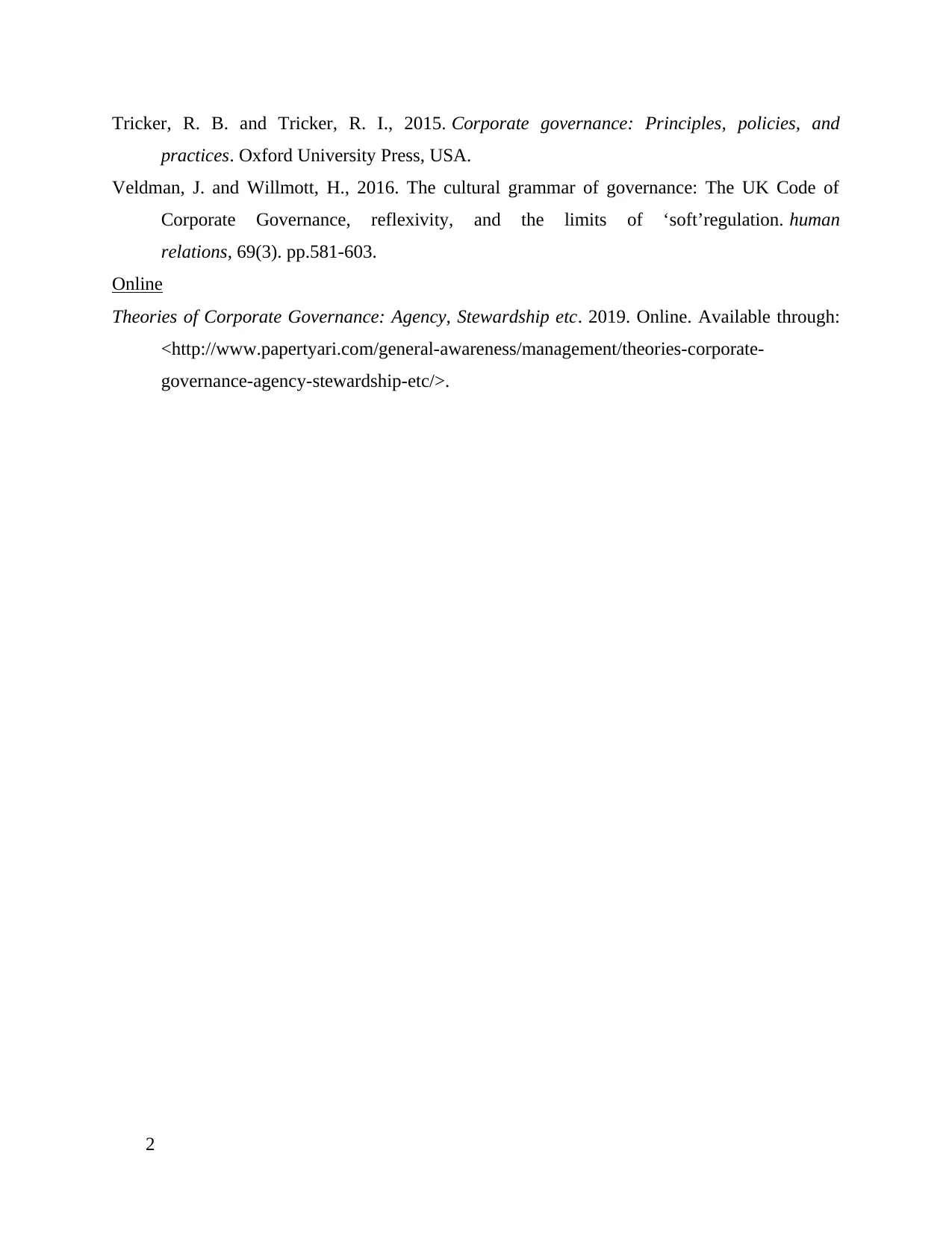
Tricker, R. B. and Tricker, R. I., 2015. Corporate governance: Principles, policies, and
practices. Oxford University Press, USA.
Veldman, J. and Willmott, H., 2016. The cultural grammar of governance: The UK Code of
Corporate Governance, reflexivity, and the limits of ‘soft’regulation. human
relations, 69(3). pp.581-603.
Online
Theories of Corporate Governance: Agency, Stewardship etc. 2019. Online. Available through:
<http://www.papertyari.com/general-awareness/management/theories-corporate-
governance-agency-stewardship-etc/>.
2
practices. Oxford University Press, USA.
Veldman, J. and Willmott, H., 2016. The cultural grammar of governance: The UK Code of
Corporate Governance, reflexivity, and the limits of ‘soft’regulation. human
relations, 69(3). pp.581-603.
Online
Theories of Corporate Governance: Agency, Stewardship etc. 2019. Online. Available through:
<http://www.papertyari.com/general-awareness/management/theories-corporate-
governance-agency-stewardship-etc/>.
2
1 out of 10
Related Documents
Your All-in-One AI-Powered Toolkit for Academic Success.
+13062052269
info@desklib.com
Available 24*7 on WhatsApp / Email
![[object Object]](/_next/static/media/star-bottom.7253800d.svg)
Unlock your academic potential
Copyright © 2020–2026 A2Z Services. All Rights Reserved. Developed and managed by ZUCOL.





